
I didn't actually intend to read this book. I felt that after suffering the disappointments of three volumes of John Mortimer's lackluster short stories about Rumpole, none of them a patch on the television scripts, I was pleased to end on the very high note of his terrific novel Rumpole and the Penge Bungalow Murders. So I had to bite my lip a little when my friend David offered to lend me this 2006 novel, worried that it might spoil the very happy memory of the very good book that I'd finished. Since I'm certainly not quite so tacky as to reward a friend's generous thought that I should enjoy it with a negative review - it's not like this is some infernal Harry Potter book here, and the lender a fangirl blind to its faults - you dear readers have probably guessed that I did enjoy this novel a good deal in the end.
This time out, Rumpole is again defending one of the members of the extended Timson family when a niece of the present accused asks for his help. Her husband, a doctor born in Pakistan, has been arrested as a terrorist and, because the security of the nation is at stake, not told what the evidence against him is; indeed, not even told specifically what he's meant to have done. Attempting a defense is one of Rumpole's greatest challenges to date; because of the classified nature of the intelligence, even he can't find out where he's supposed to begin.
Britain's draconian laws meant to protect its citizens from terror attacks had clearly got under Mortimer's skin. There was actually a lot of outrage from very good writers about just how oppressive things were getting at this time. A 2005 John Wagner-scripted episode of Judge Dredd, illustrated by Phil Winslade, was written from a similar perspective of disgust and distrust. Poor Rumpole is finding the evolving basics of courtroom behavior enough of a struggle - judges with word processors? - and to have the laws amended so that hearsay can be entered into evidence is almost too much to bear. And now this.
Things are also as bad as ever on the home front. She Who Must Be Obeyed and her eternal ally Dodo are not at all pleased with Rumpole sinking so low as to defend a terrorist, despite Rumpole's insistence that, in the first place, the government hasn't even started to make a formal case proving that he's anything of the sort, and in the second, he's just "an old taxi," obliged to represent anybody who asks for him. But his intransigence costs him his standing with his best-paying clients, the Timsons, who want nothing to do with either their errant niece or anybody who defends terrorists, and, now that his wife is writing her own memoirs to set straight the record about their tumultuous marriage, it will probably give him a blacker eye there than he thought possible. Then when "the Mad Bull," Lord Justice Bullingham, starts calling around after his wife, you start to wonder just how much an Old Bailey Hack is meant to bear.
This is certainly not a good entry point to the series, as there are quite a few subplots and supporting characters and tightly-drawn continuity by this point, but I would certainly recommend it first to anybody familiar with the character from TV, and secondly to readers not necessarily interested in how it reads as one book in a series, but how well the angry Mortimer handles the controversial subject matter. Not as air-punchingly awesome as The Penge Bungalow Murders, but definitely worth a look.
No comments:
Post a Comment